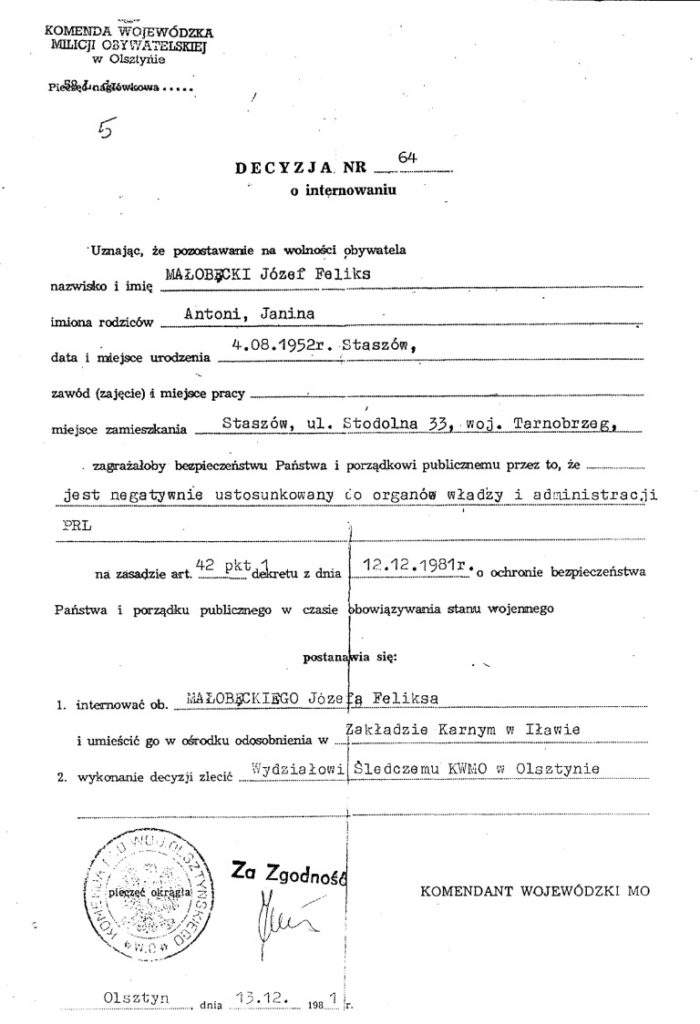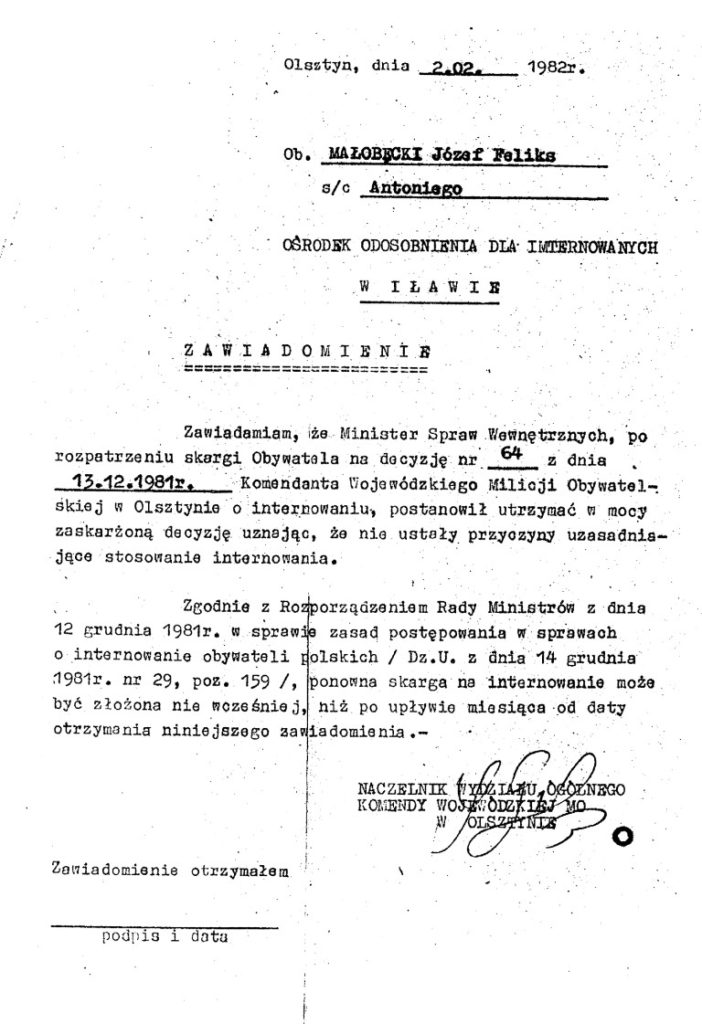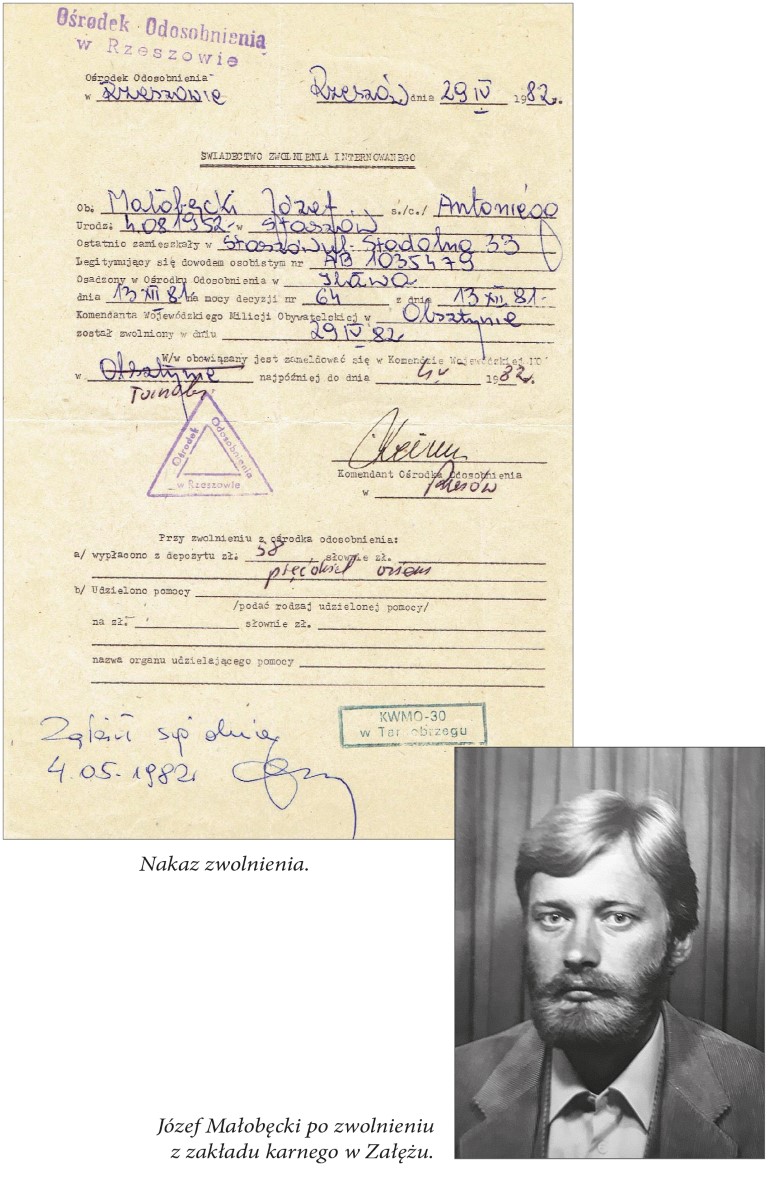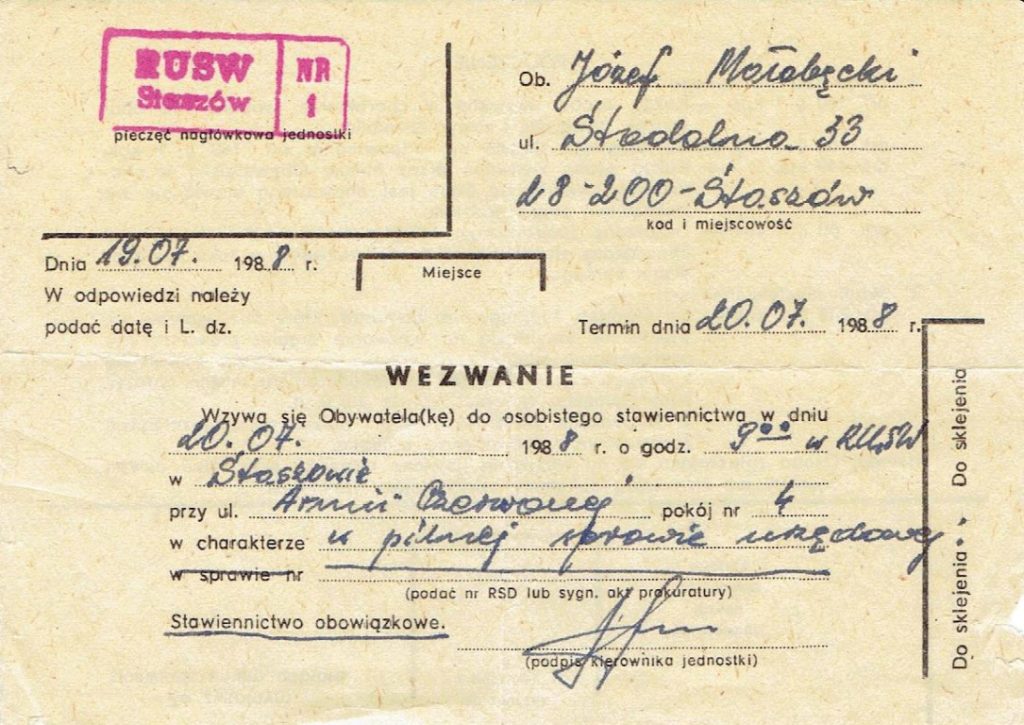Participants of the meeting hurriedly left the Shipyard area to return to their regions as soon as possible and there, together with their crews, prepare for further developments. Only Józef Małobęcki from “Sandomierz Land” took part in the meeting. It is not known why the member of the Regional Board, Mieczysław Pomorski, appointed by Stanisław Krupka as a replacement, did not come to the meeting. Józef Małobęcki decided to return to Staszów with Antoni Kopaczewski and members of the National Committee of “Solidarity” from the “Podkarpacie” region.
It was snowing heavily. Józef Małobęcki fell asleep quickly after two-day-long discussions. He woke up when, in the snowdrift, the car was trying to get through a column of tanks probably heading in the direction of Warsaw. Near Ostróda the car was stopped by militia cars blocking the road. The militiamen asked: “Who are you gentlemen and where do you work?,” and after getting an answer they ordered the detainees to follow the militia car up to the building of Militia Headquarters. Then they were asked to enter the building and not to leave it. Józef Małobęcki was arrested in this way.
In the building there were already members of the National Committee from the “Lesser Poland” Region with its chairman Wacław Sikora, his deputy Stefan Jurczak and Board member Tadeusz Syryjczyk, as well as the chairman of the Solidarity of Individual Farmers Trade Union, Jan Kułaj. After a while, Bogusław Mikus, chairman of the “Chełm” Region, Bronisław Geremek, a union expert, and Jan Strzelecki, son of Solidarity Weekly reporter, were introduced. In total, there were more than a dozen detainees in the room. No one present knew exactly what had happened; it was only assumed that the arrest was not by chance.
At 6 a.m. everything was clear. After listening to Wojciech Jaruzelski’s speech about the introduction of martial law in the whole country on the radio, all those present already knew what was the reason for their detention. After a few minutes, the detainees began to be summoned one by one. After checking their personal data, an officer in the rank of major handed over ready arrest warrants with the decision to place them in a penal institution in Iława.

Decision of imprisonment.
Before noon, the arrested were taken out to the militia van. In the corridors of building there were a lot of armed ORMO soldiers (Voluntary Reserve of the Citizen’s Militia), whose eyes and faces did not bode well. Józef Małobęcki learned from the stories told by his friends that there was no shortage of similar ORMO soldiers cases during martial law among the people he knew in Staszów. In the late afternoon they all ended up in the Penal Institution in Iława. Bronisław Geremek and Jan Kulaj were separated from the rest of arrested. The others were placed in one, already partially occupied cell. Arrested activists from north-eastern regions of Poland were kept here. The cell consisted of two rows of three-level beds and a narrow passage between them was incredibly crowded. The claustrophobic atmosphere was created by semi-darkness and stuffiness, intensified by cigarette smoke. This is how they stayed for the first weeks, after which the detainees were separated from each other. Józef Małobęcki was placed in a cell with those arrested and some beaten during the street clashes with ZOMO (Mechanized Officers of the communists Citizen’s Militia) in Gdańsk.
The internees’ hope for a change in the situation was strikes in Polish factories, especially strikes in the Silesian Mines. The pacification of strikers in the “Wujek” Mine by the ZOMO, during which 7 miners were killed, caused the collapse of mass strikes in Poland.

Answer to the internment decision challenged by Józef Małobęcki.
Moving from cell to cell by prison guards decision at any time of day or night was not uncommon. The lack of contact with family, the cold, inedible prison meals, and the lack of even visual contact with the outside world (fixed blinds on the windows) had a rather depressing and discouraging effect on the prisoners’ moods. The order to leave clothes and shoes outside the cells at night was ignored. The outer garments were also used to cover oneself at night because of the cold in the cells. Fingerprints, which the “Solidarity” prisoners did not want to give, were taken under threat of force. The stay in prison became increasingly monotonous, despite long and heated discussions about what had happened and its consequences for the future.
Christmas Eve in 1981 was the first Christmas ever spent away from the family home. Christmas wafers sent by relatives were exchanged. Christmas carols and the song God save Poland resounded late into the night in all the cells and on all the floors, although the singers were silenced under the threat of force. Wacek Sikora’s refusal to dismantle the Christmas crib in his cell resulted in its demolition by the prison police.
Józef Małobęcki spent his last weeks in Iława with trade unionists from Ostrołęka, Elblag, Gdańsk, and Szczytno. He met with those arrested together sporadically in the prison yard, and saw some of them later only in the penal facility in Załęże near Rzeszów. In the third decade of January, Józef Małobęcki was transported by a police van to the building of the Provincial Prosecutor’s Office in Sandomierz. He was transported by 4 armed militiamen and one warrant officer, who immediately announced that he would “blow his head off” in case of any uncontrolled movement. After many hours of night travel, the first activity in the prosecutor’s office was a personal search and taking of hidden contact addresses.
In the building of the prosecutor’s office, Józef Małobęcki and his wife Jolanta met for the first time (Józef Małobęcki’s family found out about his stay in Iława only in the second decade of January 1982. Thus the rumors circulating that he had been killed in Gdańsk or had escaped to Sweden were verified.)
After four days of being held alone in the basement of the Sandomierz prosecutor’s office, Józef Małobęcki was taken to the prison in Załęże near Rzeszów.
On the night when martial law was introduced in Staszów, the chairmen of the mine’s “Solidarity.” Bolesław Kozłowski, Andrzej Ptak and Zygmunt Bartkowski, the chairman of “Solidarity” in Połaniec, were arrested. Apart from Piotr Trych, who was not arrested (he left for vacation on the second day of martial law), the other three founders of Solidarity at the Sulfur Mine were imprisoned. In the first week of martial law, Bolesław Zabranny from the Budomont building cooperative and Barbara Siejka from the Modar clothing factory were immediately fired. Ryszard Guła and Stanisław Nagórka from the “Jedność” Disabled Cooperative were transferred to other positions. It was repression and revenge for the engagement and activity in NSZZ “Solidarity.” Other union activists in other plants were summoned to warning “talks.” On February 6, 1982, Wojciech Wiśniewski, Dariusz Kolatorowicz, Stanisław Juszczak, and Paweł Kosiarski, second-year students from the Technical School of Mechanical Engineering in Staszów, were arrested for printing and distributing independent press. The interventions taken by teachers Krystyna Semrau, Jan Niezgoda, Janina Dąbrowska and Stanisława Zarzycka did not influence the decision to sentence the students to 4 and 4.5 years in prison.
Józef Małobęcki’s wife and his family still remember that the entire house at Stodolna Street (today Armii Krajowej Street) was surrounded by the Militia and Militia’s secret collaborators. The Militia responded to pounding on the door and the refusal to open it by threatening to break it down. After opening the door, the Militia carried out a search in the house, supposedly looking for Józef Małobęcki who was hiding there.
Józef Małobęcki was unable to meet Bolesław Kozłowski in Załęże. He was released after a few days of martial law. He made contact with Andrzej Ptak through a window between the first and second floors of the prison. The contact was broken a few days after Andrzej Ptak was released. In Załęże, activists from the “Sandomierz Land” region, the “Podbeskidzie” the “Lesser Poland” region and even the “Lower Silesia” region stayed. It was better to be among their own. There was another meeting with Antoni Kopaczewski – the chairman of “Podbeskidzie” region and other members of the joint trip back from the last National Commission meeting in Gdańsk.
The paradox and, at the same time, perfidy of the communists’ actions in Poland at that time was the release of common criminals from prisons and filling them with arrested “Solidarity” members. Once again, in the history of the People’s Republic of Poland, the communists betrayed the interests of the Polish state. The martial law decree was an act of breaking even the law they had established. It was an unconstitutional act, introduced by a decree of the State Council, dominated by the henchmen of imperial Soviet Russia. The responsibility for martial law falls on the leadership of the communist party and its main decision-maker, the obedient executor of the decisions of Soviet Russia – Wojciech Jaruzelski, possessing the most important available attributes of unlimited power (First Secretary of the PZPR, Prime Minister of the Government, Minister of National Defense). His subversive, lying words of “choosing the lesser evil” led to the murder, beating and abuse of strikers and the arrest of several thousand people. His activities also led to the firing and dismissal of countless people, thousands of job verifications, and the emigration of many thousands.
Martial law means further economic backwardness of Poland and its subordination to Soviet Russia. Martial law also means Poland’s further isolation in the world arena, incalculable and irreparable losses in culture, the arts, education and the exchange of scientific and technical ideas. Above all, martial law deprived the nation of the hope of “Solidarity” for an improvement in the life of the Polish people and the Polish state. Such were the results of martial law in Poland.
In Załęże, the abrupt and unexpected bans on leaving the cell started again. It was a form of intimidation, uncertainty of the person leaving the cell as to his further fate. Józef Małobęcki was first placed in a cell with the activists of the “Sandomierz Land” and “Lesser Poland.” Among the latter was Andrzej Sikora, the brother of Wacław Sikora, the chairman of the “Lesser Poland” Region, to whom Józef Małobęcki passed the news of his brother Wacław imprisoned in Iława. Later he was transferred to the activists from Stalowa Wola. The next cell was with Jan Kozłowski, the chairman of “Rural Solidarity” (an old friend), and other activists from Stalowa Wola. After subsequent “relocations” (it is difficult to count how many there were) the last cell was shared by: Janusz Kotulski – the chairman of “Solidarity” in the Stalowa Wola Steelworks, Czesław Stopiński – a member of the union from the Stalowa Wola Steelworks, and Józef Małobęcki. Janusz Kotulski’s irrepressible humour made us feel better. Józef Małobęcki and Zygmunt Bartkowski often met.
Cardinal Franciszek Macharski, Metropolitan Archbishop of Cracow, visited the prisoners in Załęże in March. Forced by the detainees, the Sunday mass kept their spirits up. The singing of religious songs spread throughout the prison, passing to the criminal cells, for which the detainees in the other wings of building expressed their gratitude to the “Solidarity” activists in secret messages. The atmosphere of mass was permeated with a specific patriotic exaltation, and it sustained the detainees’ confidence in the rightness of the idea of freedom. The masses never had such an unprecedented effect. Each morning the song When the morning rises resounded. The most popular and most often sung in Iława and Załęże was the song of the Bar Confederates. Supposedly it was sung in all places where “Solidarity” activists were arrested in Poland. It was a symbol of the idea of “imprisoned Solidarity.” In general, the atmosphere among the arrested was militant. After one of the nights, when the detainees were banging on the prison doors to demand better medical care for some of the imprisoned, the prison authorities, in order to intimidate them, introduced the ZOMO in full riot gear. It ended in a demonstration of force.
Among those arrested were not only “Solidarity” activists. Students from the Independent Students’ Association and university lecturers were arrested. It happened that students shared the cells with their lecturers. There were 60-, 70-year-old soldiers of the Home Army and the National Armed Forces, members of the Polish People’s Party (Polskie Stronnictwo Ludowe) – just after Second World War opposed to the communist regime, militia members from the Solidarity Trade Union of the Militia, the Democratic Party (democrats disobedient to the communist regime), Pax activists (disobedient Edward Antończyk, chairman of PAX in Tarnobrzeg), and others.
The commune was afraid of everyone. Those with the past and those with the future. Literally all those who represented, no matter in which years and organizations, the goals, aspirations and dreams of the Polish nation. The interrogations began. At the first such “social meeting” the interrogating secret police officer (SO – the Security Office, known for its cruelty in the 1940s and 1950s, and replaced for camouflage purposes by the SS – Security Service) accused Józef Małobęcki of collaboration with a foreign intelligence service. The accusation was so serious that Józef Małobęcki was literally stunned. In that case, the only possibility was to deny the accusation, which Józef Małobęcki did during the next interrogation.
There were several such “meetings.” During one of them, an interrogating secret police officer, who knew Staszów, made three surprising proposals to Józef Małobęcki. They were preceded by a sympathetic speech about the coming spring and the beautifully green grass, senselessness of continuing the anticommunist activity, and unnecessary separation from his family. The proposals were as follows:
-
Cooperation with the Security Service, in which meetings, due to the secrecy of cooperation, would be conducted, e.g., in the area around the lakes in Golejów near Staszow.
-
He will remain in prison during martial law, for an unknown period (“In Hungary, Mr. Józiu, after 1956 it took several years”).
-
Emigrate with family to any Western country of his choice.
The answer had to be given within a week by contacting any Polish political police officer.
There was no need to think about the first proposal. It was hideous. J. Małobęcki left the others to time. Days and weeks were passing. Nothing indicated that martial law would be abolished. The situation did not normalize according to the ideas of “Solidarity.” The Staszów environment showed no interest in the fate of Józef Małobęcki or his closest family, who were not emotionally prepared for such repressions. At the end of April, Józef Małobęcki agreed to the third proposal – emigration. Zygmunt Bartkowski, chairman of Solidarity at the power plant in Połaniec, had given similar consent.

Document of realise and Józef Małobęcki after his release from the penitentiary in Załęże
After Józef Małobęcki was released from prison, many people supported his decision. Among these people was Bolesław Walczak from Wschodnia Street, who expressed his opinion positively about the decision with the words: “the communists will never forget this,” he said positively about the decision. He and the others had personal experience with the people’s government and their opinions were the most authoritative.
There was an order to report periodically to the Provincial Headquarters of the Militia in Tarnobrzeg. It was difficult to predict what else the communists could do.
Having completed all the necessary formalities, Józef Małobęcki, his wife Jolanta, and son Jakub left Poland on September 29, 1982 for the United States, deeply believing that they would return to free Poland and their hometown of Staszów. LET’S HOPE.
Actually, they did not forget.

A summons to appear at the Citizen’s Militia Headquarters during their first stay in Poland after 6 years in the United States.
Written in Lowell, Massachusetts, United States of America, on the 10th anniversary of martial law and the 2nd anniversary of the Solidarity seizure of power in Poland.